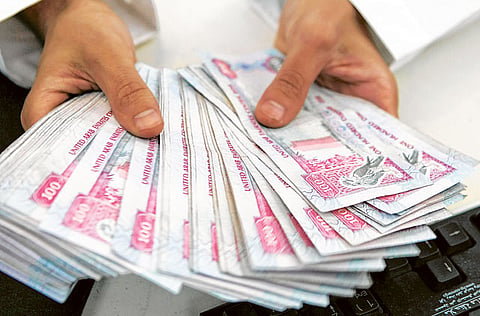In Theory: GCC banks face dollar peg conundrum
Despite the financial and economic difficulties suffered recently by the US economy, the central banks of many Gulf Cooperation Council (GCC) countries have stressed that they will continue to peg their currencies to the dollar

Despite the financial and economic difficulties suffered recently by the US economy, the central banks of many Gulf Cooperation Council (GCC) countries have stressed that they will continue to peg their currencies to the dollar.
There are technical reasons for this. There is the link between oil revenues and the dollar, as well as the financial and monetary complications that may surface as a result of the de-pegging process, due to the current global financial situation. Also, an important part of Gulf central banks' reserves are pegged to the dollar.
All this seems reasonable. However, there have been announcements by certain governors of Gulf central banks that GCC banks do not own any financial instruments issued by the US government — including US treasury bonds — because of the drop in the revenues of these securities. This contradicts prior data from the same sources which said that 97 per cent of their reserves are dollar denominated.
This is a hard puzzle to solve, because it is difficult to connect these two approaches practically. The Gulf central banks' huge reserves of hard currency, estimated to be $54 billion (Dh198.342 billion) in the UAE alone, are almost all dollar denominated — but at the same time, the central bank's governor says that these sums are employed outside the US.
One would assume that there is an explanation for this mismatch. For example, there may be financial approaches by some central banks with their own special philosophy in distributing their reserves. But it is fair to say that not only was the Gulf business sector confused by the situation, but others outside the GCC were equally puzzled.
The Financial Times issue of August 5 pointed towards the same subject. Camilla Hall wrote:
"Economists have been taken aback by the central bank statement because the dirham is pegged to the US dollar, making holding US government debt an obvious choice."
Confusion
This presumption by investors and analysts is a result of the absence of an explanation of this issue, as indicated by FT. This situation has led to the confusion of investors and market financial analysts, who also failed to solve the puzzle.
The situation coincided with a tense international financial atmosphere due to the debt crisis in Eur-ope and the US, which required those markets that are less affected by the crisis, such as those in the Gulf, to protect themselves.
Such protection is undoubtedly obtained by refraining from making statements that do not suit the current international financial status quo.
Instead they are substituted with transparent statements in both local and international markets aimed at inspiring confidence in Gulf markets, and reflecting the true, positive economic and financial situation in GCC countries in general.
But this is not the first time statements and procedures of central banks have confused the business sector.
Two years ago, the central bank took a decision — which was difficult to understand — restricting the distribution of profits in shared national banks, so that they would not to exceed 50 per cent of net profits.
Local banks are inflicted with a liquidity glut, a fact acknowledged by the central bank itself. Local bourses suffer a high liquidity crisis which is increasingly getting worse with international financial fluctuations.
Banks expressed their discontent regarding these procedures. They rightly expected that an important part of the profit distributed will be pumped back into Gulf markets, while the rest will feed liquidity in other sectors, including real estate.
Negative imprints
Moreover, the decision itself left negative imprints on the whole economic situation and will deprive the local market from the liquidity that can contribute to reviving many sectors affected by the reoccurring financial crisis.
So in conclusion, the data of the financial establishment — especially central banks — must be clearer and more professional, which calls for the re-evaluation of these procedures from time to time to discover their appropriateness with economic developments.
The decision regarding restricting bank profit distributions is left untouched in a drawer, and may well be forgotten by now, despite the fact that it became an obstacle in the way of liquidity influx towards a thirsty market.
Mohammad Al Asoomi is a UAE economic expert.



